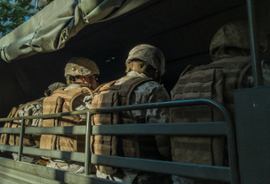Summary
- The Government Accountability Office has examined the latest data gathered in the Periodic Health Assessment.
- The GAO has highlighted critical flaws in the methods used, noting that many of the cases regarding problem gambling were based on self-reports.
- We still lack a true understanding of how gambling problems impact military personnel while on duty.
Problem gambling has become a deeply rooted concern within the US military, affecting both combat readiness and overall operational strength in ways that are not yet fully understood. Growing numbers of individuals are demanding a genuine effort to measure and tackle this issue. Recent findings analyzed by the Government Accountability Office (GAO) have uncovered significant flaws in how gambling-related harm and disorder among active-duty service members are being addressed. The current approach largely depends on individuals to come forward voluntarily, but the reality is that many remain hesitant to admit they need help.
Some military members who gamble experience negative emotions
The GAO delved into the Army's 2024 Periodic Health Assessment, seeking a deeper understanding of a concerning issue. Among the 310,482 Army service members who participated, 15,039 admitted to gambling in the past year. Of these, 402 individuals, or 2.7%, reported feeling anxious, restless, or irritable when attempting to cut back on their gambling. The GAO is exploring the ripple effects of gambling within military ranks. There remains a lack of clear evidence about whether gambling problems lead to the revocation or denial of security clearances, leaving a significant question unanswered. Meanwhile, the Defense Health Agency reports that approximately 185 service members have acknowledged a gambling disorder. However, this figure is likely not comprehensive, as it relies on self-reporting, which can have serious implications for career growth. Army Lt. Col. Isaac Lopez, a clinical psychologist with the Defense Health Agency-Public Health, is at the forefront of raising awareness about this issue. He emphasizes that personnel struggling with gambling disorders are at risk of facing more severe challenges, such as substance abuse, which could impact combat readiness. Though this is a serious concern, the official data to support this claim is still lacking.
People who do not seek treatment or speak about their problem are not part of the statistic
The Government Accountability Office has raised a crucial alarm: gambling is easily accessible to military personnel, and our brave servicemen and women might be more vulnerable to addiction than the general public. Although there are 185 reported cases of gambling addiction within the service, Kristy Williams, a director specializing in defense capabilities and management, acknowledges that this number doesn’t capture those who haven’t sought medical help or those who didn't meet the current diagnostic criteria. It's clear that the military has yet to fully understand or address this growing concern. Meanwhile, the presence of slot machines on bases continues to fuel these challenges, further entrenching the issue among the ranks.





























